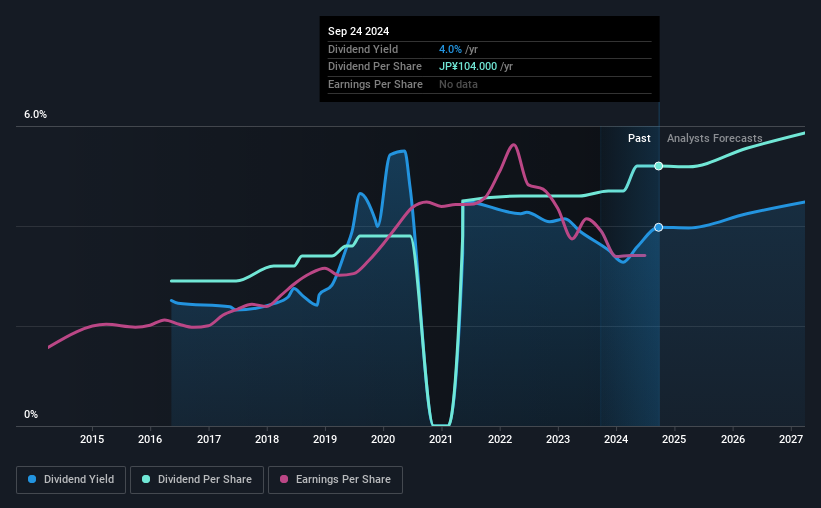Japan Post Insurance (TSE:7181) Is Increasing Its Dividend To ¥52.00

Japan Post Insurance Co., Ltd. (TSE:7181) will increase its dividend from last year's comparable payment on the 5th of December to ¥52.00. This takes the annual payment to 4.0% of the current stock price, which is about average for the industry.
Check out our latest analysis for Japan Post Insurance
Japan Post Insurance's Payment Could Potentially Have Solid Earnings Coverage
Solid dividend yields are great, but they only really help us if the payment is sustainable. Before making this announcement, Japan Post Insurance was earning enough to cover the dividend, but it wasn't generating any free cash flows. No cash flows could definitely make returning cash to shareholders difficult, or at least mean the balance sheet will come under pressure.
Over the next year, EPS is forecast to expand by 3.0%. If the dividend continues along recent trends, we estimate the payout ratio will be 46%, which is in the range that makes us comfortable with the sustainability of the dividend.

Japan Post Insurance's Dividend Has Lacked Consistency
Even in its relatively short history, the company has reduced the dividend at least once. This makes us cautious about the consistency of the dividend over a full economic cycle. Since 2016, the annual payment back then was ¥58.00, compared to the most recent full-year payment of ¥104.00. This implies that the company grew its distributions at a yearly rate of about 7.6% over that duration. A reasonable rate of dividend growth is good to see, but we're wary that the dividend history is not as solid as we'd like, having been cut at least once.
Japan Post Insurance May Find It Hard To Grow The Dividend
Given that the dividend has been cut in the past, we need to check if earnings are growing and if that might lead to stronger dividends in the future. Earnings per share has been crawling upwards at 2.3% per year. The company has been growing at a pretty soft 2.3% per annum, and is paying out quite a lot of its earnings to shareholders. While this isn't necessarily a negative, it definitely signals that dividend growth could be constrained in the future unless earnings start to pick up again.
In Summary
Overall, we always like to see the dividend being raised, but we don't think Japan Post Insurance will make a great income stock. With cash flows lacking, it is difficult to see how the company can sustain a dividend payment. We would probably look elsewhere for an income investment.
Investors generally tend to favour companies with a consistent, stable dividend policy as opposed to those operating an irregular one. However, there are other things to consider for investors when analysing stock performance. To that end, Japan Post Insurance has 2 warning signs (and 1 which is concerning) we think you should know about. Looking for more high-yielding dividend ideas? Try our collection of strong dividend payers.
If you're looking to trade Japan Post Insurance, open an account with the lowest-cost platform trusted by professionals, Interactive Brokers.
With clients in over 200 countries and territories, and access to 160 markets, IBKR lets you trade stocks, options, futures, forex, bonds and funds from a single integrated account.
Enjoy no hidden fees, no account minimums, and FX conversion rates as low as 0.03%, far better than what most brokers offer.
Sponsored ContentNew: Manage All Your Stock Portfolios in One Place
We've created the ultimate portfolio companion for stock investors, and it's free.
• Connect an unlimited number of Portfolios and see your total in one currency
• Be alerted to new Warning Signs or Risks via email or mobile
• Track the Fair Value of your stocks
Have feedback on this article? Concerned about the content? Get in touch with us directly. Alternatively, email editorial-team (at) simplywallst.com.
This article by Simply Wall St is general in nature. We provide commentary based on historical data and analyst forecasts only using an unbiased methodology and our articles are not intended to be financial advice. It does not constitute a recommendation to buy or sell any stock, and does not take account of your objectives, or your financial situation. We aim to bring you long-term focused analysis driven by fundamental data. Note that our analysis may not factor in the latest price-sensitive company announcements or qualitative material. Simply Wall St has no position in any stocks mentioned.
About TSE:7181
Japan Post Insurance
Provides life insurance products and services in Japan.
Very undervalued with acceptable track record.
Similar Companies
Market Insights
Community Narratives



